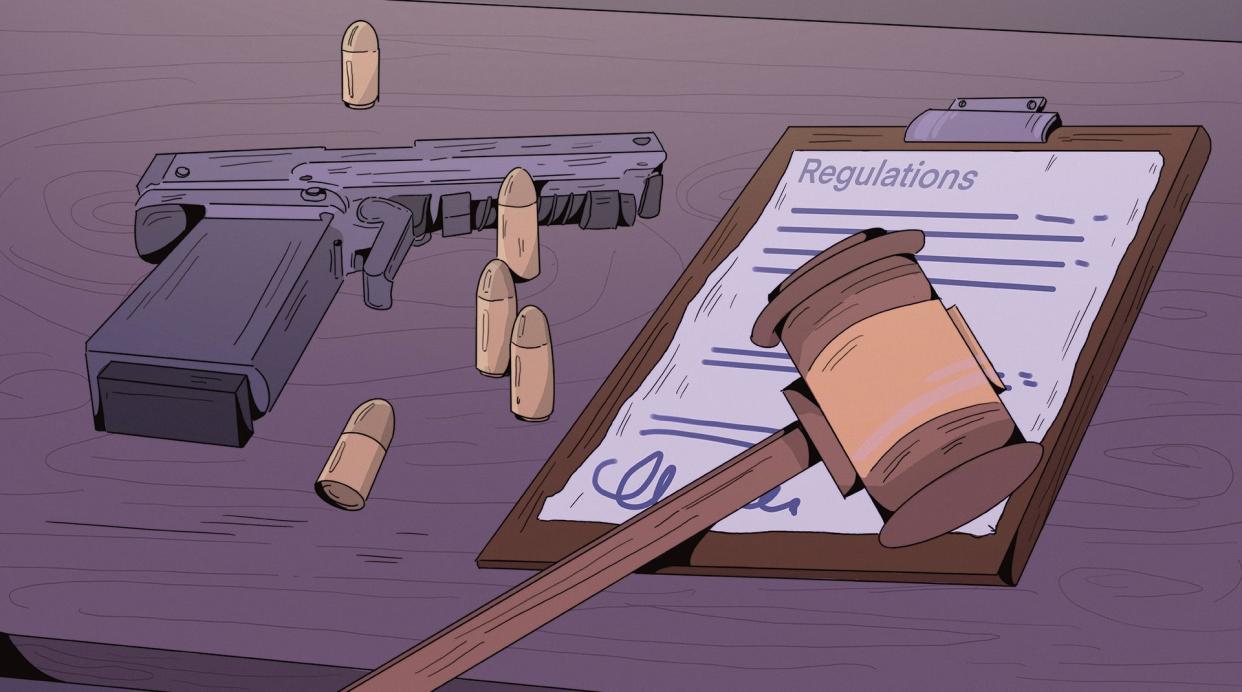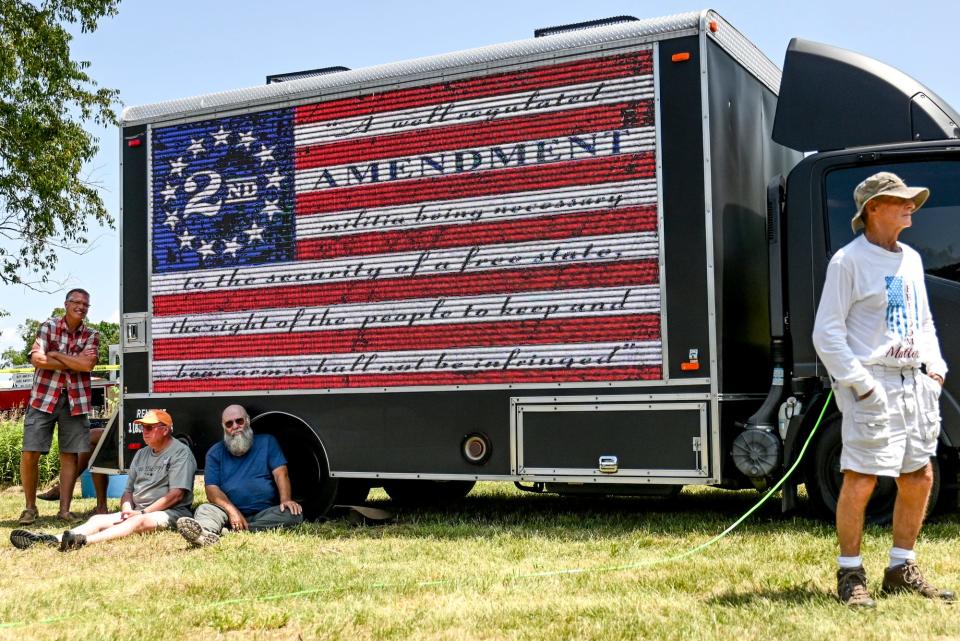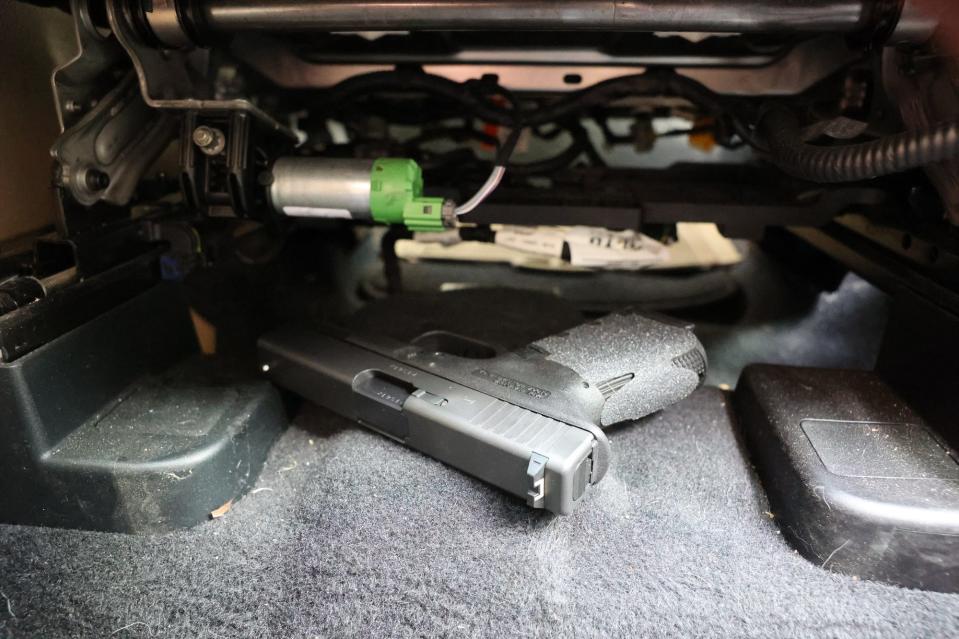As nearly 10K guns fill SPD's evidence room, these federal laws limit local prevention efforts

The manufacture, sale and distribution of firearms is largely governed at the federal and state levels. Municipalities have little control, if any, over how guns are acquired or change hands within their jurisdictional boundaries. What does this mean, then, for counties and cities grappling with violent crimes and their efforts to avert growing gun violence?
Here is an overview of the laws that govern the manufacture, sale and distribution of firearms at the federal, state and local levels.
Federal gun laws
The highest law of the land is the Second Amendment to the U.S. Constitution, one of the original 10 amendments known collectively as the Bill of Rights, which were ratified by three-fourths of the then-existing 14 states on Dec. 15, 1791.
It reads: A well regulated Militia, being necessary to the security of a free State, the right of the people to keep and bear Arms, shall not be infringed.
The constitutional law interpretation of “well regulated Militia” and “shall not be infringed” is generally where conflict arises.
Over the course of our nation’s history, federal laws have been passed that restrict the manufacture and distribution of certain types of firearms and determine who can legally purchase a firearm.

The 1968 Gun Control Act built upon the 1963 Gun Control Act, both of which were passed in the wake of the assassinations of President John F. Kennedy, civil rights leader Dr. Martin Luther King Jr., and U.S. Sen. Robert F. Kennedy.
The 1963 Gun Control Act initially considered prohibiting the purchase of firearms through the mail, because John Kennedy's assassin Lee Harvey Oswald bought the rifle he used in Dallas, Texas, through an ad in American Rifleman magazine. That provision did not pass, however, until the 1968 law imposed federal licensing of individuals to manufacture or deal in firearms and banned all interstate transportation of weapons to and from individuals not licensed as dealers, manufacturers, importers or collectors. This law established the Federal Firearms License (FLL) program.
Two of the most notable laws in the 45 years since include the Brady Handgun Violence Prevention Act (a.k.a. “the Brady Act”) and the Public Safety and Recreational Firearms Use Protection Act (a.k.a. “the Assault Weapons Ban”).
The Brady Act is named for James Brady, the press secretary for President Ronald Reagan who was critically injured in 1981 and partially paralyzed for life after being shot in the head during an assassination attempt on the president by John Hinkley Jr. This law, passed by the 103rd Congress in 1993, mandated federal background checks on firearms purchasers in the United States and imposed a five-day waiting period on purchases. That waiting period was shortened in 1998 after the implementation of the National Instant Criminal Background Check System (NICS).
Many of the provisions of the Brady Act still govern from the federal level who can legally purchase and possess firearms in the U.S.
Those persons prohibited from purchasing, possessing or receiving a firearm include:
An individual who has been convicted of a felony or is awaiting trial on felony charges.
A known drug user or addict, established through seized paraphernalia and positive drug tests.
An undocumented immigrant who was not lawfully admitted for permanent residence within the U.S..
An individual dishonorably discharged from the U.S. military.
A fugitive from justice.
An individual subject to a domestic restraining order that prohibits contact with an intimate partner or child of the subject and poses a threat to the physical safety of partner or child.
That final category, someone who is subject to a domestic restraining order, is causing concern today.
The Supreme Court announced plans to take up the Rahimi case, after its decision in 2022 to overturn New York State’s century-old concealed carry law. The 5th Circuit Court of Appeals, which handles appeals from federal courts in Texas, Mississippi and Louisiana to Texas, Mississippi and Louisiana, struck down in 2022 the federal law prohibiting possession of firearms subject to domestic violence protection orders.
The bipartisan Assault Weapons Ban, signed into law in 1994 by President Bill Clinton, banned the manufacturer and consumer sales of the AR-15 and other semiautomatic rifles. The U.S. Congress allowed the assault weapons ban to sunset in 2004 and, according to the National Shooting Sports Foundation (NSSF), the number of AR-style weapons has more than doubled in the U.S. in the 19 years since. According to the NSSF, there are more than 20 million AR-15-style semiautomatic weapons in circulation.
Georgia gun laws
In 2022, Georgia enacted “permitless carry” legislation, which means any Georgia resident 21 years of age and older can purchase a firearm, including handguns, rifles and shotguns, without a waiting period, without a permit and without registering the firearm. There is no requirement for safety training. And residents can open carry with a weapons carry license (WCL).
There are no restrictions on the sale of magazines or amount of ammunition. Semiautomatic rifles are legal to buy and possess.
WCLs are available through Chatham County Probate Court for $86.25 and are valid for five years. Renewals cost $38.
Georgia also recognizes concealed carry permits from all states.
Federal laws prohibiting the sale of firearms to certain individuals still apply, however.

According to the Giffords Center to Prevent Gun Violence, federal law requires FFL dealers (but not private sellers) to initiate a background check on the purchaser prior to sale of a firearm. Federal law provides states with the option of serving as a state “point of contact” and conducting their own background checks using state, as well as federal records and databases, or having the checks performed by the FBI using only the NICS. (State files are not always included in the federal database.)
Until 2005, Georgia was a “point of contact” for the NICS, and firearms dealers had to conduct the background check required by federal law through the Georgia Bureau of Investigation. In 2005, Georgia repealed that part of the law, and now all firearm transfers by licensed dealers are processed through the FBI. Georgia, however, has no laws requiring the sales of firearms be reported to a state or local agency.
Georgia law provides that all transfers or purchases of firearms conducted by an importer, manufacturer or dealer licensed pursuant to Federal or Georgia law are subject to NICS. Georgia law also requires the Georgia Crime Information Center (GCIC) to provide to NICS all necessary criminal history information and wanted person records, and information concerning persons who have been involuntarily hospitalized, to complete a NICS check. State administrative regulations also recognize that federal law requires FFLs to contact NICS before transferring a firearm.
Federal law does not require dealers to conduct a background check if a firearm purchaser presents a state permit to purchase or possess firearms that meets certain conditions. As a result, concealed weapons permit holders in Georgia are exempt from the federal background check requirement. (Note, however, that people who have become prohibited from possessing firearms may continue to hold state permits to purchase or permit firearms – and pass background checks – if the state fails to remove these permits in a timely fashion.)
In Georgia, firearms seized by law enforcement agencies cannot be destroyed. Agencies must first make every effort to find the legal “innocent owner” of a firearm if, during the course of an investigation, it is determined the firearm was stolen – not unusual in Chatham County and Savannah where hundreds of guns are stolen annually, primarily from unlocked cars.

Law enforcement agencies then must sell the recovered weapons to FLLs and those proceeds must be used to first fund administration of the program and any surplus to fund general operation of that agency.
Since 2021, Federal agencies such as the Bureau of Alcohol, Tobacco, Firearms and Explosives (ATF) have increased their presence in Chatham County to help local agencies tackle gun violence and the flow of weapons in larger cities, such as New York and Chicago. That increased presence, according to Savannah Police Captain George Gundich has increased the SPD's recovery of guns used in crimes "three or four times to what it used to be."
SPD recovered 200 guns during the last five months of 2022. As of July 2023, City of Savannah Public Safety Communications Manager Neil Penttila said SPD had about 10,000 guns seized from crime scenes in its evidence room, which is overflowing.
Said Gundich, "We're running out of room for them."
Public Safety reporter Drew Favakeh and former investigative reporter Raisa Habersham contributed to this article.
This article originally appeared on Savannah Morning News: Savannah gun control limited by federal laws, Second Amendment

